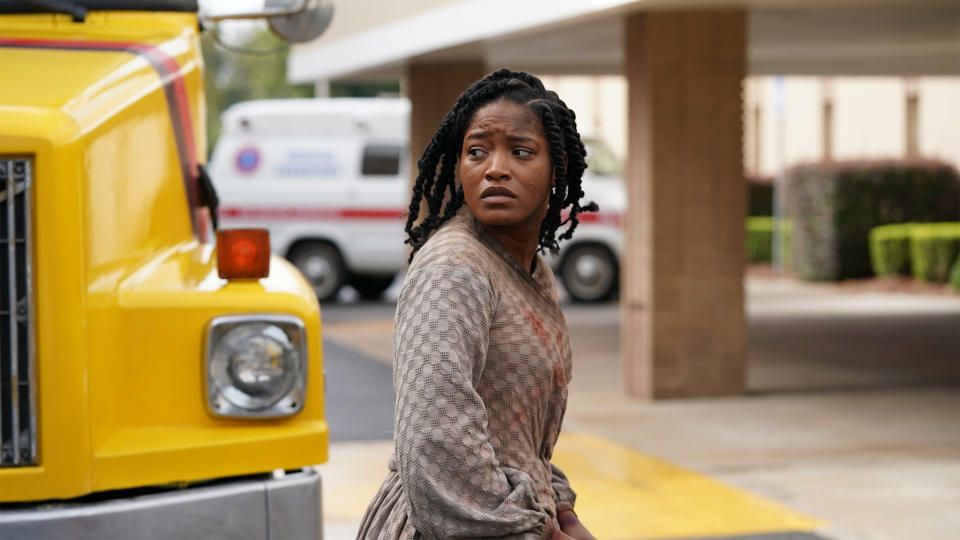Sundance Review: Keke Palmer & Common In ‘Alice’

Krystin Ver Linden’s debut movie Alice arrives with the assurance that it is based on true events, one of those vague guarantees that lingers in the back of your mind while the movie unspools and what you think you’re watching turns out to be something very, very different. Factuality is often a moot point in cinema—with his legendarily terrible 1957 space vampire flick Plan 9 from Outer Space, Ed Wood even tried reverse-psychology, asking viewers, “Can you prove that it didn’t happen?” But with a slick slave drama-slash-revenge thriller it immediately raises questions of taste and decency: is this really the proper vehicle for a meditation on Civil Rights? Surprisingly, Ver Linden’s film walks that tightrope very well. There are wobbles for sure, but the commitment from her cast keep its intentions pure even when the storytelling falters, which is often.
There is no way to discuss Alice properly without revealing the movie’s big twist, which is freely referenced in publicity materials and yet happens a full 37 minutes into its running time. Until then, Alice is the favored slave on an isolated plantation ruled—literally with an iron rod—by the ruthless Paul Bennet (a good, grizzled performance from Jonny Lee Miller). At the beginning, Alice (Keke Palmer) is settling down to married life, dreaming of the life that must be out there somewhere. She sees her family and friends brutalized, and she herself falls into her master’s bad graces, which leads to her being tied up, beaten and chained up on the mansion’s lawn overnight. When she’s released, Alice fights with Paul, blinds him in one eye and escapes.
More from Deadline

Roadside Attractions
After a dramatic flight through the woods, Alice emerges blinking into the sunny glare of a Georgia freeway, which is where she meets Frank (played by Common), who almost runs her over when she faints in front of his truck. Frank takes her to hospital, assuming that Alice is suffering from concussion, but when the authorities make moves to have Alice committed to a sanatorium for a psych check, Frank goes back and sneaks her out (“That’s where they take you and drill your brains out,” he warns, sagely). In Frank’s apartment, Alice learns that the year is 1973, that slavery has long been abolished, and that her nemesis Bennet’s sister is in the phone book. She also begins the swift but stylish transition into an avenging angel with a cool wardrobe and a big, defiant Afro.
The switch from a fake past to a stylized present is well handled, but, as always happens in these fish-out-of-water scenarios, time drags while we see Alice acclimatize to the ’70s, learning about zip fasteners, Sanford and Son, and Pam Grier (“The Baddest Chick Around,” according to Jet magazine). Frank plays her side two of Stevie Wonder’s “Innervisions, and away she goes, cramming info from an encyclopedia that reveals all about MLK, Malcolm X, Angela Davis and many others. As the film completes its gear shift, Alice confronts an unrepentant figure from her slave past in a coffee shop where everyone talks so much about coffee that it begins to feel like a bizarre, subliminal summoning of Pam Grier’s 1973 vigilante movie Coffy. If that’s the case, it’s quite clever. What’s not so clever is that, in the next scene, Frank takes Alice to the cinema to see Coffy, and, to be honest, the film never really recovers from a strange melding of reality, fiction and meta-fiction that even Quentin Tarantino might have second thoughts about.
For all its flaws, though, Alice is consistently interesting, and Palmer has a lot to do with that, carrying the film with grace and simplicity in a part that could conceivably finished another actor altogether. The same goes for Common, whose Frank comes with so much baggage that his domineering, Nixon-supporting big brother is about the least of his worries. Ironically, it’s these attempts to tame the film’s wilder B-movie elements that drag it down, and after one’s initial nervousness about the film’s appropriateness, it becomes clear that Alice could have been a bit—or even a lot—more out there. Maybe not Django Unchained out there, but certainly a lot braver.
“Freedom is a word you will never understand in a million years,” Alice is told before she sets off on her final, roaring rampage. “I am freedom,” she snaps back.
That’s the film you want to see. If only there was more of it.
Alice makes its world premiere in the U.S. Dramatic Section of Sundance. The movie will open in theaters stateside on March 18 via Roadside Attractions.
Best of Deadline
Cancellations/Renewals Scorecard: TV Shows Ended Or Continuing In 2021-22 Season
New On Prime Video For January 2022: Daily Listings For Streaming TV, Movies & More
Winter Premiere Dates For New & Returning Series On Broadcast, Cable & Streaming
Sign up for Deadline's Newsletter. For the latest news, follow us on Facebook, Twitter, and Instagram.

 Yahoo Movies
Yahoo Movies 
